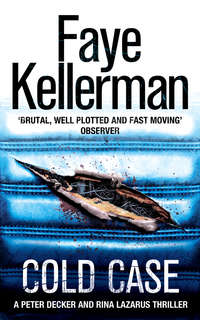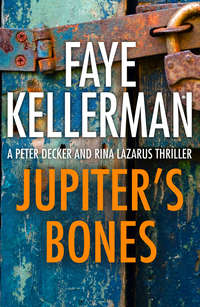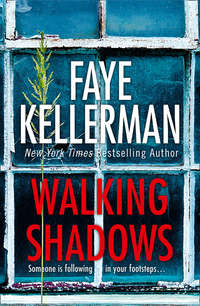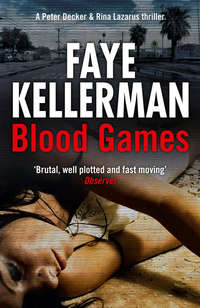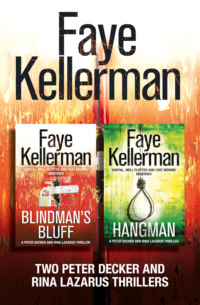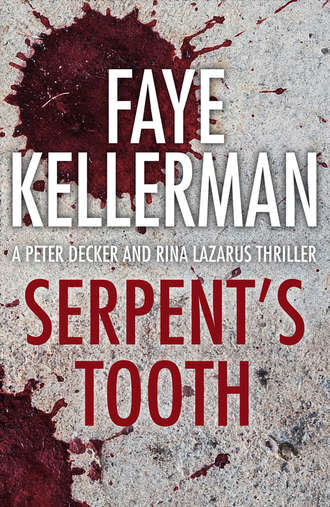
Полная версия
Serpent’s Tooth
Tears streamed down her face.
“I wanted to hurt him. Because he’d been messing around on me for so damn long. If I had known he was so unstable, I wouldn’t have …”
“You couldn’t have known, Rhonda.”
She looked down into her orange juice glass as if reading tea leaves. “After we broke up, he did things. Weird things. I guess I knew he was flipping out. But I didn’t know it would lead to this.”
“Of course not. What did he do?”
Rhonda returned her eyes to Decker. “Tried to scare me. Made calls in the middle of the night, ranted on about how he was going to get me. But I never took him seriously.” She looked up. “Thinking it over, I have a feeling I was one of the lucky ones.”
True enough. Decker pointed to her duffel bag. “Where are you planning to go?”
Rhonda stopped rocking, blew out air. “I got an offer to do a gig in Hawaii. Some honcho wants me to paint Playboy playmates on his walls. No accounting for tastes.”
“Vacation might do you good.”
“Hope so.”
Decker said, “Do you have some old pictures of him?”
“Maybe one or two. Why?”
“I didn’t find any recent pictures of Harlan in his apartment.”
Rhonda was taken aback. “That’s odd. I know he has a portfolio—”
“No, I found that. I’m talking about things like photo albums.”
She shrugged. “Weird. Because we took quite a few …” She smiled. “Quite a few compromising ones. After we broke up, he told me he was going to send them to my mother. I told him to go ahead … ain’t nothing she’s never seen before.”
“Did he?”
“If he did, Mom never said a word.”
Decker said, “Rhonda, if Harlan was a member of SAG, he must have had an agent.”
“He had a couple light-years ago. Fired them all.”
Decker’s beeper went off. Rhonda stood up from the rocker. “Phone’s on the wall.”
Decker’s eyes scanned the mural, rested on a painted phone kiosk. Mounted on the wall, inside the painted booth, was a real, three-dimensional pay phone. “Do I need money to make the call?”
“Credit card’s fine.”
Decker said, “I’m slow on the uptake, didn’t get much sleep. I can’t tell if you’re putting me on.”
Rhonda smiled tightly. “It was a joke.”
“Sorry to be so dense.”
“Mr. Dumb Lug.” Rhonda rolled her eyes. “About as slow as a roadrunner. Sly, too. So why do I find myself trusting you? Is that how you extract confessions? You get people to trust you, then you slam them?”
“I don’t slam anyone, least of all someone like you.” Decker looked at the pager’s number. Strapp’s office.
Rhonda said, “I’ll be back in a minute. Help yourself to the phone.”
“Thanks.” Decker punched in numbers; the captain picked up on the fifth ring.
“Get over to the station house. Community is planning a major memorial for Estelle’s victims this afternoon. You’re expected to be there. Show some community support and help me field the press.”
“I’ll be at my office in ten minutes.”
Strapp said, “Good quote yesterday, Decker. About the scene being your worst nightmare. If you can think up a few more like that … something that shows compassion … that would be good for us … for LAPD.”
Decker was silent.
Strapp said, “Look, I know it sounds politico, but tough. This is our chance to make a good impression. Our asses have been fried in print for so long, it would be real nice if we could be represented as the public servants we really are.”
“I understand, sir.”
“Good, then. Get down here. We’ll strategize together.”

After a full day of hospital visits, bereavement calls, and heart-wrenching services for the dead, Decker made it back to the station house, his energy depleted, his brain crashing against his skull like a tidal wave. Advil wouldn’t cut it. Dry-mouthed, he swallowed a couple of Darvocets, but knew even that wouldn’t be enough. Rooting in his shirt pocket, he pulled out a pack of cigarettes. Lit up a smoke and rubbed his aching temples. Marge came in a few moments later, holding a half-dozen manila envelopes which she used to fan away smoke.
“You must feel like shit warmed over.”
Decker stubbed out the cigarette. “Trying to compose myself before I go home. I don’t want Rina to see me like this. How’d the interviews go? Learn anything?”
“Depressingly unremarkable. Can I sit?”
“Of course.” Decker pointed to a chair, eyed his smoke.
“Go ahead, Pete. I remember well your smoking days.”
“Just a temporary lapse.” Again, Decker lit up. “Tell me about the interviews.”
“Nothing to tell. Bullets started flying, people started screaming, running for cover. Truly terrifying.” Marge paused, collected her thoughts. “From what I could gather, it seems that Harlan wasn’t deliberate in his shooting. Didn’t shoot at any one person specifically, or even aim at people for that matter. He just opened fire. A lot of it. The boys and I have been comparing notes. They agree with that assessment.”
Marge paused.
“Since this kind of thing is rare, I don’t really know what’s considered the typical behavior for mass murderers.”
“Off the top of my head, the compatibles that come to mind are Tasmania, the Long Island Railroad, the San Ysidro McDonald’s, and Dunblane—”
“The elementary school in Scotland.” Marge paled. “God, what a world!”
Decker inhaled his smoke, tried to keep his mind focused. “I remember that in Tasmania and in San Ysidro, the murderer aimed at people. Picked them off like prey. But you’re saying that wasn’t what happened. Harlan just sprayed the place.”
“Appears that way. We’ve been working a time frame … how many minutes did the actual shooting last? Time elongates during these catastrophic events. What seems like hours could have been minutes. At the moment, we’re guesstimating.”
She held up the manila envelopes.
“I picked these up for you. Just came in from the Coroner’s Office. Probably some prelim autopsy reports. Want me to go over them? You look tired.”
Decker sat back in his chair, closed his eyes, breathed in wisps of nicotined air. “Who’s still out there?”
“All of us—Scott, Tom, Bert. We’re still writing up reports. Oh, Gaynor left about an hour ago. He said you told him to work on the case at home.”
“I’ve got him doing some computer work. His home equipment is better technologically than what we’ve got here.” Decker stubbed it out. “Give me the reports. Call the others in.”
“Right away.” Marge handed him the envelopes and left.
Decker broke open a seal, pulled out some slice-and-dice autopsy photos. Hitting him like a mace in the gut. He sifted through them with deliberation … concentration. Marge soon returned with the others. They pulled up chairs, sat in front of Decker’s desk, all of them uncharacteristically quiet.
Decker said, “I’ve got some prelim autopsy reports. Finals won’t be ready for days, so we’ll go over these—”
Oliver interrupted, “Like they’re going to tell us something we don’t know?”
“Never know.” Decker placed the photos back in the envelope. “We’ve got to re-create the shooting. Where Harlan first stood when he opened fire, who appeared to be his first victim, who was his next, and so on and so forth.”
“How do we do that?” Martinez asked.
“We’ll start with the floor plan. Draw each table and who sat where, using the reservations book. Who checked the book into evidence?”
“Yo.” Marge held up her hand.
Decker said, “Okay. We draw each table and label them. Next comes the brain work and the tedium. For this part, we’ll need basic geometry and gunshot angles. Since we couldn’t rod the victims, we’ll have to rely on Forensics.”
Decker leaned forward.
“Harlan was found dead at the bar. Don’t know if he started his shooting at the bar, but assume that he did. The bar area is off the entrance, correct?”
Nods all around.
“So assume he entered there and just started shooting. Here’s what we’re going to do. We ask ourselves … if Harlan started shooting from the bar area and was facing left, where would the first bullets have landed? Say they would have landed on table three. We look in the reservations book, find out who was at table three, and determine the nature of their wounds, if any. If it seems consistent with Harlan’s position, we go on to our next assumption. If it’s not consistent, we change our first assumption—”
“I’m lost,” Martinez said.
Decker said, “We’re trying to trace bullet paths using geometry. Go down the friggin’ list. If Harlan shot from the bar, where would his first bullets have landed? If that matches, we move on.
“If Harlan had turned to the left and shot, who would have been his next hit?
“If Harlan had turned to the right and shot, who would have been his next hit?
“If Harlan had taken a couple of steps forward, who would have been his next hit?
“If Harlan had taken a couple of steps forward and then turned to the right, who would have been his next hit?
“If Harlan had taken a couple of steps forward and then turned to the left, who would have been his next—”
“This could take months!” Oliver blurted out.
“Yes, it probably will take months,” Decker said.
“Loo, pardon mah ignorance,” Webster drawled, “but just what do you reckon to accomplish?”
“Let’s talk politics for a moment. There are bound to be lawsuits—against Estelle’s, maybe even against the city. Our police reports are going to be scrutinized with a microscope. And we’re going to be judged, folks. Every single one of us. You, me, and this entire beleaguered department.”
Decker rubbed his temples.
“I want every single bullet accounted for. Make sure that all the slugs came from Harlan’s gun and not some other outside source that we overlooked because we were too lazy—”
“Outside source?” Marge grimaced. “You think there was more than one shooter?”
“Who knows? Last count we’ve got thirteen dead, thirty-two wounded. Lots of damage for one guy, Margie.”
Martinez said, “Harlan was packing a nine-millimeter automatic double action, Loo. Fourteen rounds per magazine—”
“How many rounds did he fire, Bert?”
Martinez was quiet. “Don’t know.”
“Anyone?”
No one spoke.
Decker said, “Thirteen dead people, thirty-two wounded, and we can’t answer a simple question like how many rounds the fucker fired.”
Oliver said, “So we’ll do a bullet count.”
“We’ll do a lot more than a bullet count. I want this crime scene nailed. Every step and every shot that Harlan took must be checkbook-balanced.”
Decker leaned back in his chair.
“We’ll start tomorrow with the bullet count. Dunn and Oliver, you two take the corpses in the morgue as well as the shells and bullets left behind at Estelle’s. Check the walls, check the furniture, check the potted plants, turn the place upside down if you have to. I want every bullet, every shell, every empty magazine cited and bagged.”
“Talk about tedium,” Oliver muttered.
Decker looked at his detective—worn, disheveled, spent. “I don’t envy your assignment, Scott. The place gives me the creeps. But someone has to do it.”
Oliver ran his hands through his oily black hair. “I’m not complaining, Loo. I’m just tired.”
“I know.” Decker looked at Webster and Martinez. “You two go over to the hospitals, talk to the victims’ doctors. Have them help you get a bullet count from their patients’ medical charts or surgery dictation or even from the X rays. And if any of the victims feels like talking, you can start conducting interviews. Once we get the bullets accounted for, we’ll start analyzing the angles—”
“Y’ever think of using a computer, Loo?” Webster asked.
“Forensic reenactment.” Decker said. “Farrell’s working on a program for this as we speak. It’s a very useful tool, but first we’ve got to have data to plug into the computer. Then it’ll probably take months before he comes up with something. But that’s all right. We have time. If we’re meticulous in our calculations, maybe the computer will spit us back a step-by-step simulation of Harlan’s movements at Estelle’s.”
Webster said, “Welcome to Cybermurder.”
“Except the victims were flesh and blood.” Decker stood. “We start tomorrow. For now, all of you. Go home.”
As Decker pulled into the driveway of the ranch, he noticed the living-room light shining through the bay window. Immediately, his heart took off. Not that it was late—quarter after ten. Still, when Rina waited up for him, she always kept vigil in the kitchen or their bedroom.
He shut off the Volare’s motor, jogged to the front door, and opened it. His wife was asleep on the living-room couch. On the floor was his dog, Ginger, nestled among piles of loose papers. Next to the sheets were a calculator, pens, pencils, and a couple of ledgers.
Instant relief. Everything was all right.
Then came the curiosity. What was Rina working on? He considered rifling through the pages, but discarded the thought. All in due time. For now, let her sleep.
He regarded the room. In dim light, it seemed worn, his furniture over a decade old, purchased during his divorced days. The buckskin couch had been rubbed shiny in spots, the coffee table was scratched, the two wing chairs had faded. Keeping guard at the bay window was Rina’s pine rocker purchased after Hannah was born—the only new thing standing.
Yet Rina never said a word about replacing his shopworn pieces. Guess she was waiting for him to relinquish the last vestiges of his bachelor years. Not that his wife hadn’t added her own feminine touches. The silk-screened floral couch pillows, two hand-crocheted throw blankets, fresh flowers, and lots of framed family photos. Observing her sleeping form … he really needed to do better for her.
She stirred. Even without makeup, her face was striking, though her creamy skin was a shade paler than usual. Her lips—lush and red and always alluring. Eyes moving behind translucent lids. She was dressed in a black angora sweater and black knit skirt. Her outfit matched her raven hair, which fell over her shoulders like a sable shawl.
He shut off the light, put Ginger outside, debated checking the horses’ stables but nixed the idea. Too damn tired.
He headed into the bedroom, stripped in seconds, then beelined into the shower. Turning the water up to full pressure, he stood under the faucet, allowing the blast to run over his stubbled face while razor-hot needles rained down on his aching back, cooking his freckled skin bright red. He continued his baptism by fire until the water grew cold. By the time he was done, Rina had tucked herself into bed. She was half awake, her lids still hooded. But she spoke. “S’right?”
“I’m just fine.” Decker toweled himself off as he spoke. “Go back to sleep.”
“Boys send their regards.”
“Regards back.” He ran his hands several times through red shocks of wet hair, then went over and kissed his wife. A short one, then a long one. She purred. “That was wonderful.”
He slipped under the sheets. “That’s because you’re half asleep.”
She opened her eyes fully. “How are you holding up?”
“Been better, but I’ll survive.” Immediately, he switched the topic. “What were you doing out there in the living room with all those loose papers? Building a nest?”
Rina thought a moment. “Oh. That. Rav Schulman called—”
“Why? What’s wrong?”
“Nothing. He had some bookkeeping questions. They turned out to be a bit complicated, so I stopped by the yeshiva and picked up some of the ledgers.”
“The yeshiva doesn’t have a bookkeeper?”
“Peter, I didn’t question him. He asked me to do him a favor, I said yes.”
“You have that much spare time, go ahead.”
Rina was quiet. Decker forced himself not to push it. But he knew there was more. Lately Rina had been using the learned Rabbi for therapy … just as Decker had done many times in the past. His wife had been very depressed since an old friend of hers—and her late husband’s—had died. Abram Sparks had also been a friend of Rabbi Schulman. Decker was sure that Bram’s name had come up in the course of their conversations. Holding that thought, Decker rolled over, buried his head in the pillow.
Rina turned off the light. “Your father called today.”
Decker pivoted to face her. “And?”
“The shooting must have made the news over there. He was concerned about you.”
“What’d you tell him?”
“I lied. I said you were fine.”
“That’s not lying, I am fine.”
Rina didn’t answer.
Decker hesitated. “Did he mention my mother at all?”
“No … why?”
“No particular reason. Let’s go to sleep.”
Rina knew he was fibbing, that tight catch in his throat. He was worried about his mother, leaving Rina to wonder if her mother-in-law was ill. Eyes closed, Rina waited and waited, then gave up. She was just about asleep when he finally decided to talk.
“She called me about two weeks ago. She’d been cleaning out the garage … had some of my childhood junk and wanted to know what to do with it. I told her to send it here … or throw it away … whichever was easier. Then …”
He paused.
“Then I asked her why … at this moment in time … was she cleaning out the garage … which has been a storage house of our family junk for God only knows how many years. She just said, ‘If not now, when?’”
Rina touched his arm. “Did you ask her if something was wrong?”
“Yes, of course. As I expected, she denied any problems.”
“Did you press her?”
“I can’t press my mother, Rina. This is as big a hint as I’m going to get.”
He waited a beat.
“I can’t approach my father. Because she could be keeping something from him, too. I did call Randy. He doesn’t seem to know anything, so I guess they’ve kept him in the dark.”
“Or maybe nothing’s wrong.”
“Maybe. Either that or my brother hasn’t picked up on Mom’s nuances. He’s not a font of sensitivity.”
“Peter, why didn’t you tell me this earlier?”
“I don’t know. You have your own parents to deal with … your own problems as well.”
Rina was silent, guilt coursing through her body. “I know I’ve been very upset since—”
“It’s not important.”
Again neither spoke.
“Do you want to go out for a visit, Peter?”
“She wouldn’t like that … me, just popping in. She needs her privacy, I’ve got to respect it.”
“Darling, can you try talking to her? Hiding behind a wall of stoicism isn’t good for either of you.”
“Rina, I respect your culture. You respect mine.”
She counted to ten, told herself to breathe calmly. “How about if I called her up—”
“No—”
“Can you let me finish?”
Decker waited a moment. “Sorry. Go on.”
“I’d like to invite them out here for Thanksgiving.”
“A nice thought, honey, but I’m afraid it would rob her of her dignity. You know what Thanksgiving means to her.”
“Yes, I do. But hear me out, okay?”
“Sure.”
“Peter, I don’t like making Thanksgiving. It’s no charge for me to make yet another big feast, a month after our major holidays are over. And yes, I do know what that holiday means to her. Peter, we’ve gone down to Gainesville twice for Thanksgiving. It’s lovely, but it isn’t the kind of holiday she wants. It hurts her tremendously that we can’t eat her beautifully cooked food in her house on her special china.”
“Why? She says things to you?”
“No, of course not. But that doesn’t mean I don’t notice her wincing when we sit there at her table with fruit and raw vegetables on our paper plates.”
Decker was quiet.
Rina said, “I can’t change the fact that we’re observant, kosher Jews and they’re Baptist. That’s just life. I can’t take over her kitchen. But she can take over mine. Let me invite her out here to make her Thanksgiving with my pots and pans. Cook everything in my house in my kosher kitchen—”
“Rina—”
“I’ll buy the meat and all the trimmings, but she can have free rein. I’ll even go shopping with her to pick out a set of china of her choice. I have so many sets of dishes, one more won’t hurt. She can cook to her heart’s content. Do all her favorite recipes including her pumpkin pie. Only accommodations she’ll have to kashrut is using nondairy margarine and Mocha Mix instead of butter and milk. And, of course, no honey-glazed ham.”
“She won’t do it.”
“She doesn’t even like ham—”
“It’s not the ham, Rina, it’s the whole thing. She’ll feel displaced.”
“At least let me try. I think she’ll come out. I think she’d love to cook up a storm, actually have us eat her meals. And then there’re the grandchildren—Cindy as well as our Hannalah—”
“That means Randy’s left alone.”
“So I’ll invite Randy and the kids and wife number …”
“It’s still three.”
“Your nieces and nephews will love it here. Disneyland—”
“They’ve got Disney World, Epcot Center, and Universal Studios. Theme parks are no big deal to them.”
“Yes, but we’ve got Las Vegas—”
“Oh, my sister-in-law will love that.”
Rina sighed. “Just think about it, okay?”
Decker was quiet. “You’d put up my brother’s family?”
“Absolutely. I find Randy … interesting—”
“I love my brother.”
“I know that.” Rina smiled. Even though Randy worked two jobs—he was a vice cop and moonlighted as a security guard—he was always flat broke. Peter had been sending him cash for years.
Silence. Then Decker said, “I’ll call Mom tomorrow.”
Rina said, “I’ll call her tomorrow. She’ll say no to you, but yes to me.”
Decker knew that was all too true. He turned toward his wife, draped an arm around her shoulders, and drew her to his chest. He kissed her mouth, licked her lips. “I love you.”
“I love you, too.” She kissed him again. “Want to make more out of this?”
“Wish I could.” He laughed. “I’m afraid I’d be arrested on charges of Assault with a Dead Weapon—”
Rina laughed, slapped his shoulder. She kissed him gently, licked his mustache. Her hands snaked around his body, stroked his long muscular back with tender fingertips.
He let out a soft rumble. “Feels good.”
“I think I detect signs of life—”
“That’s not life, that’s just a reflex.”
“Whatever it is, it’s good enough for me.”

Waking up before the sun, Decker showered, shaved, and said his morning prayers alfresco, bathed in the golden light of dawn. Afterward, he let the dog out, pitched fresh hay to his stable of four horses, changed the animals’ water, went through yesterday’s mail, and had coffee brewing by the time Rina roused the crew for school.
Although anxious to get his professional life going, Decker forced himself to make a little time for breakfast and family affairs. The day’s topics included his stepson’s driver’s license, buying a newer car for Rina, and giving Sam his own set of wheels in the form of Rina’s old Volvo. Decker promised they’d hit the car lots on Sunday. And if Rina had the inclination, maybe they’d look at new living-room furniture as well. His wife was surprised, delighted. Immediately bright with ideas. Decker felt good. It had been a long time since he’d seen Rina’s smile.
After the boys left for school on the bus, Decker played zoo with Hannah, her stuffed animals being nefarious creatures of prey, and Ginger, the Irish setter, doubling as Simba the Lion. Then Decker carted his daughter off to school. Hannah threw her pipe stem arms around his neck, kissed him on the cheek with soft little lips. Decker felt an overwhelming desire to cling to her, to lug her into work in a papoose. Instead, he lowered her to the ground and watched her scamper off. The experts talk about separation anxiety. Were they referring to the child or the parent? Cloaked in wistfulness, Decker left the neon-painted schoolhouse, arriving at the station by half past eight.


